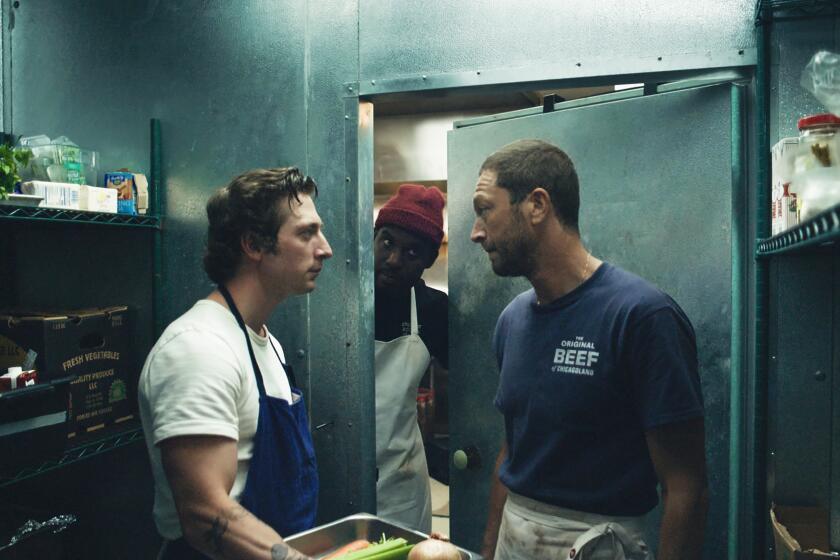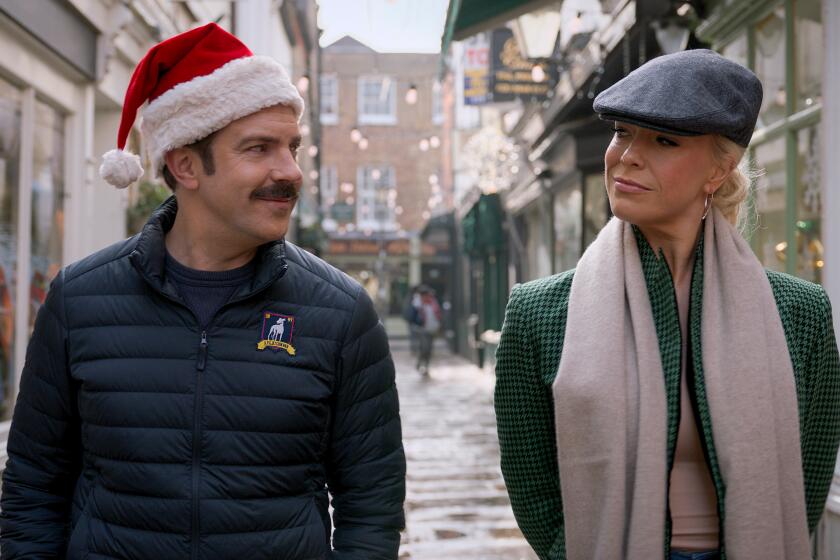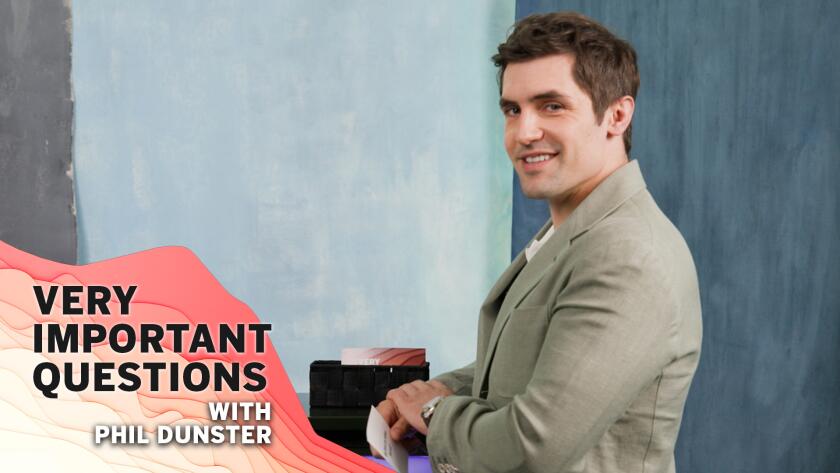On shows like ‘Ted Lasso’ and ‘Succession,’ a curse word was ‘a beautiful, powerful sound’

One of the most ironic things about the shift away from broadcast television to streaming and premium channels is that audiences are now regularly paying to see stories where, unencumbered by FCC guidelines or network-specific stringent standards and practices regulations, characters can speak more freely and talk like real people.
And provided that their writers can be trusted, many of these shows have taught us that everyone — be it police officers, media oligarchs, American politicians, British football players, Russian empresses, midcentury housewives turned comics, or kitchen crews at struggling Chicago restaurants — curses. A lot.
“The idea we have that somebody who runs a country is somehow exempt from that kind of humanity or looseness or whatever is probably, for the most part, not the case,” said Debora Cahn, creator of the Netflix political drama “The Diplomat,” in an interview ahead of the series premiere in April.
Cahn, whose credits also include Showtime’s “Homeland” and NBC’s “The West Wing,” said that “that the difference between what’s happening behind the scenes and what’s happening in front of the scenes is so absurdly stark.” In writing her show, she said, “I was certainly looking for an opportunity to play something that could really thrive on that kind of juxtaposition.”
But it isn’t just that all of these characters curse; it’s that they all seem to have the same favorite curse word: f—.

The word is used so many times on the HBO series “Succession” that a version of it was essentially a catchphrase for the series’ patriarch Logan Roy (Brian Cox). Ahead of the show’s final season, which premiered in March and ended on Sunday, the news and culture website the Ringer crunched the numbers to see, among other things, which character uses it the most. (At that time, it was Roman (Kieran Culkin), Logan’s son, by a landslide.)
The anxiety-provoking penultimate episode of the first season of Hulu’s “The Bear,” which sees practically everything that can go wrong in a professional kitchen actually go wrong as a restaurant staff opens for the lunch rush, used it around 80 times. Given that the episode clocks in at under 21 minutes, this breaks down to about four a minute.
Jeremy Allen White stars as an elite chef who inherits his family’s struggling Chicago beef sandwich shop in “The Bear,” premiering Thursday on Hulu.
And its frequency in Hulu’s “The Great” is so ubiquitous that a third-season plot point revolved around it being a baby’s first word.
Elle Fanning, who stars as Catherine the Great in the occasionally accurate period comedy, promised that all of the instances of the word uttered in that show are scripted. She laughed that “I think we actually even took some f—’s out sometimes” when series creator Tony McNamara feels there are too many.

But “The Great” also has a penchant for another curse word that is unprintable in this publication; this one starting with a “p.” And the second-ever episode of “Succession” is titled “S— Show at the F— Factory,” which is a reference to a news article mentioned in the series.
So why is it that this curse word seems the most ubiquitous among scripted TV series?
Brendan Hunt, one of the creators and stars of Apple TV+’s “Ted Lasso,” in an interview prior to the writers’ strike, said that his sports dramedy uses a lot of curse words “but f— is more of a Swiss Army knife than the rest of them.”
Fans who call themselves “rom-communists” say the characters are destined to be together, pointing to clues in the Apple TV+ show and interviews by the cast.
He thinks it’s because of the hard “k” at the end; something he feels has “a beautiful, powerful sound to it that makes it f—ing irresistible, frankly.”
Writers also have to look at what kinds of characters will curse and when.
In “The Diplomat,” it’s meant to be surprising and also a character trait when the otherwise reserved U.K. Foreign Secretary Austin Dennison, played by David Gyasi, drops a litany of F-bombs after he witnesses a shocking event. But it’s also worth noting that this only happens behind closed doors and when he’s alone with someone he trusts, like Kate Wyler, a U.S. diplomat played by Keri Russell.
“That Dennison could be the way he is in his formal dress and strive for people and then, behind closed doors, that might slip out in his language, I think that that’s quite a nice marriage,” Gyasi said.

It’s also a cultural issue. Like Dennison on “The Diplomat,” the titular character Ted Lasso, played by Jason Sudeikis, is an outsider looking to be thought of as a leader. Hunt said that because his show’s lead character comes from “good Midwestern stock,” he’s more likely to speak in folksy witticisms and dad jokes. Ted reserves the word for specific moments when he wants to make an impact. This contrasts with the show’s snarling footballer-turned-coach Roy Kent (Brett Goldstein), who can’t stop using it even after being admonished by a primary school teacher.
Even though the word might be more common vernacular in the U.K. than it is in the United States, Hunt said on “Ted Lasso,” its usage (or lack thereof) is also “indicative of the degree to which the person gives a f— about how they are perceived. Ted cares a lot more than Roy does.”
All of these shows are also airing during a sea change in the way Americans speak, according to lexicographer Jesse Sheidlower. Now working on the fourth edition of his book “The F-Word,” which chronicles the changing definitions and usage of the word, he said he’s seen for decades how “sexual and scatological terms have become increasingly less problematic” while others, like those used to describe racial or ethnic minorities, have become more so.
Apple TV+ executives say ‘Ted Lasso’s’ success didn’t inform their landmark deal with the MLS — but it also didn’t hurt.
But it still depends on how you use these curse words.
Sheidlower said that using “f—,” or “s—” for their actual definitions as “sexual terms or excretory terms; that’s still offensive. But that’s not because of the word itself. It’s because those concepts remain taboo.”
However, he said,“using ‘f—’, or ‘s—’ in some figurative sense [has] become increasingly more acceptable while still having enough valence that they pack a punch.”
This is opposed to something like “c—,” which Sheidlower said may be acceptable in British English but “in American English, you can’t say it at all. It remains about the worst thing and that’s partly because, in American English, there is no relatively neutral form for it.”
Hunt has experienced this first-hand. Apple TV+ wouldn’t allow a scene in the show’s first season where the kindly pub owner Mae (Annette Badland) explained all of the variant uses for c— in British vernacular because of how offensive that word still is in America.
That “Ted Lasso” even uses the F-word at all might be uncomfortable for some, given the series’ vibe.
“There are not that many so-called ‘wholesome’ shows that use ‘f—’ as much as we do. That’s fine,” Hunt said. “But maybe we’re the next evolution of wholesome shows. People say ‘f—’. It does not mean that they are not of high moral fiber or lovable or people who feel like us.”
More to Read
The complete guide to home viewing
Get Screen Gab for everything about the TV shows and streaming movies everyone’s talking about.
You may occasionally receive promotional content from the Los Angeles Times.










